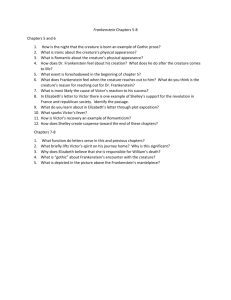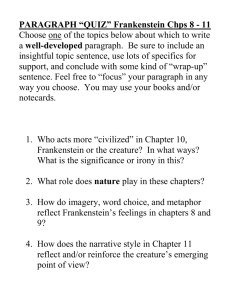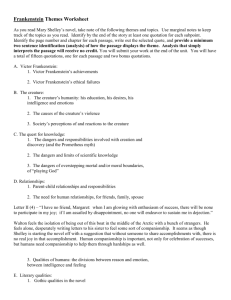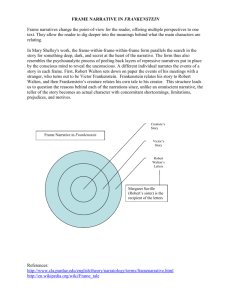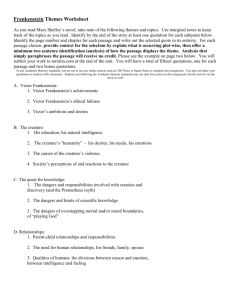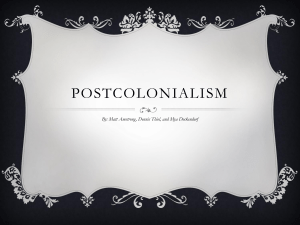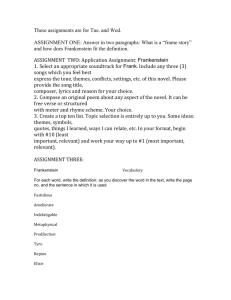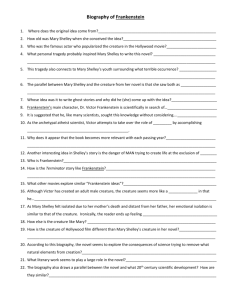Frankenstein - Langenscheidt
advertisement
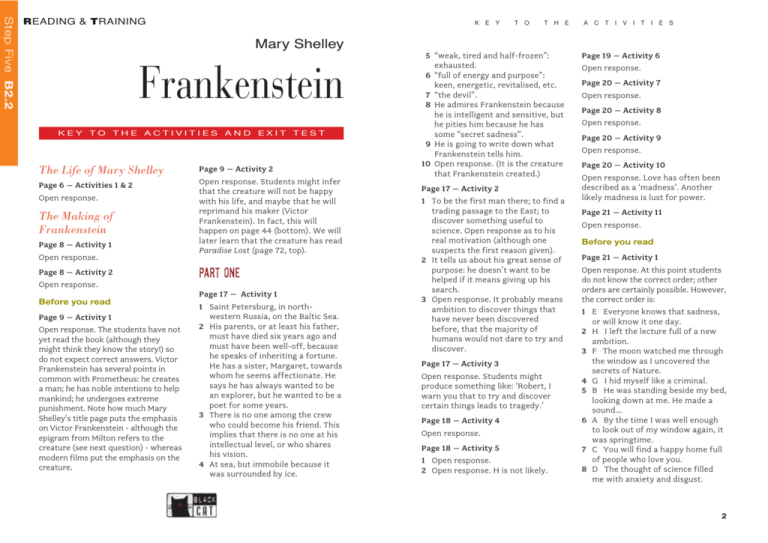
Step Five B2.2 READING & TRAINING K E Y T O T H E A C T I V I T I E S Mary Shelley Frankenstein KEY TO THE ACTIVITIES AND EXIT TEST The Life of Mary Shelley Page 9 – Activity 2 Page 6 – Activities 1 & 2 Open response. Students might infer that the creature will not be happy with his life, and maybe that he will reprimand his maker (Victor Frankenstein). In fact, this will happen on page 44 (bottom). We will later learn that the creature has read Paradise Lost (page 72, top). Open response. The Making of Frankenstein Page 8 – Activity 1 Open response. Page 8 – Activity 2 PART ONE Open response. Before you read Page 9 – Activity 1 Open response. The students have not yet read the book (although they might think they know the story!) so do not expect correct answers. Victor Frankenstein has several points in common with Prometheus: he creates a man; he has noble intentions to help mankind; he undergoes extreme punishment. Note how much Mary Shelley’s title page puts the emphasis on Victor Frankenstein - although the epigram from Milton refers to the creature (see next question) - whereas modern films put the emphasis on the creature. Page 17 – Activity 1 1 Saint Petersburg, in northwestern Russia, on the Baltic Sea. 2 His parents, or at least his father, must have died six years ago and must have been well-off, because he speaks of inheriting a fortune. He has a sister, Margaret, towards whom he seems affectionate. He says he has always wanted to be an explorer, but he wanted to be a poet for some years. 3 There is no one among the crew who could become his friend. This implies that there is no one at his intellectual level, or who shares his vision. 4 At sea, but immobile because it was surrounded by ice. 5 “weak, tired and half-frozen”: exhausted. 6 “full of energy and purpose”: keen, energetic, revitalised, etc. 7 “the devil”. 8 He admires Frankenstein because he is intelligent and sensitive, but he pities him because he has some “secret sadness”. 9 He is going to write down what Frankenstein tells him. 10 Open response. (It is the creature that Frankenstein created.) Page 17 – Activity 2 1 To be the first man there; to find a trading passage to the East; to discover something useful to science. Open response as to his real motivation (although one suspects the first reason given). 2 It tells us about his great sense of purpose: he doesn’t want to be helped if it means giving up his search. 3 Open response. It probably means ambition to discover things that have never been discovered before, that the majority of humans would not dare to try and discover. Page 17 – Activity 3 Open response. Students might produce something like: ‘Robert, I warn you that to try and discover certain things leads to tragedy.’ Page 18 – Activity 4 Open response. Page 18 – Activity 5 1 Open response. 2 Open response. H is not likely. Page 19 – Activity 6 Open response. Page 20 – Activity 7 Open response. Page 20 – Activity 8 Open response. Page 20 – Activity 9 Open response. Page 20 – Activity 10 Open response. Love has often been described as a ‘madness’. Another likely madness is lust for power. Page 21 – Activity 11 Open response. Before you read Page 21 – Activity 1 Open response. At this point students do not know the correct order; other orders are certainly possible. However, the correct order is: 1 E Everyone knows that sadness, or will know it one day. 2 H I left the lecture full of a new ambition. 3 F The moon watched me through the window as I uncovered the secrets of Nature. 4 G I hid myself like a criminal. 5 B He was standing beside my bed, looking down at me. He made a sound… 6 A By the time I was well enough to look out of my window again, it was springtime. 7 C You will find a happy home full of people who love you. 8 D The thought of science filled me with anxiety and disgust. 2 K E Y T O T H E Page 22 – Activity 2 Name: Victor Frankenstein Place of study: Ingolstadt Subject studied: science, but he then specialises in chemistry Influential professor: Mr Waldman Professional ambition: to create human life Place of birth: Geneva Occupation of father: magistrate What happened to his mother: died of scarlet fever, caught from Elizabeth Name of brother: William Name of adopted sister: Elizabeth Genetic parents of adopted sister: an Italian nobleman and a German lady Ambitions of parents regarding adopted daughter: to marry Victor Name of best friend: Henry Clerval Ambition of best friend: to be a poet PART TWO Pages 30-31 – Activity 1 A 1 Cause 1 Elizabeth’s illness 2 Victor’s mother died 3 Mr Waldman’s chemistry lecture 3 Effect • Victor’s departure for Ingolstadt is delayed • Victor felt sad and lonely • Victor’s new ambition to become a scientist A C T I V I T I E S 2 Open response. Some possibilities are: • Victor’s departure for Ingolstadt was delayed due to Elizabeth’s illness. • Victor felt sad and lonely because his mother died / because of his mother’s death. • As a result of Mr Waldman’s chemistry lecture, Victor’s new ambition was to become a scientist. 3 Because they understand everything about nature that was previously a mystery: they are omniscient. Other answers are possible. 4 That these words will persuade him to start a process whose events will lead to his destruction. (This literary device which shows us a glimpse of what happens later is called ‘foreshadowing’.) B 1 Robert Walton. Frankenstein is telling him his story on board Walton’s ship. 2 I worked day and night, … All summer I worked… The leaves fell from the trees, and still I worked. 3 I explored dead bodies and tortured living animals, … 4 How he felt at the time: …but my work did not seem horrible to me then. I thought that I had conquered death. I would be the creator of a new race of happy and excellent creatures. K E Y T O T H How he feels now: What horrible work it was! All summer I worked on my filthy creation… Any ambition that makes you forget the people that you love and the simple pleasures of ordinary life is bad. C 1 One o’clock in the morning (therefore, at night). The time is probably significant: if the creature came to life in spring or summer and/or in the morning, there might be a feeling of optimism. In a European November, and in the middle of the night, the atmosphere is dark and not optimistic. 2 He feels horror and disgust. 3 A Elizabeth B He embraces and kisses her. C Her faces changes into Victor’s mother’s face. D She seems to wear a funeral shroud; he sees worms in it. 4 He sees the creature by his bed. 5 His meets his best friend, Henry Clerval. 6 Frankenstein’s family is well, but they are worried about him. 7 He is afraid the creature might appear again. It doesn’t. 8 He is very ill. D 1 A father is in good health B William has grown tall and is a lovely little boy C Justine the servant has returned to the family E A C T I V I T I E S 2 He feels anxious and disgusted by science. 3 Open response. Page 32 – Activity 2 1 knowledge 2 mysterious 3 disastrous 4 ambitious 5 necessarily 6 nervous 7 criminal 8 achievement 9 horrified 10 monstrous Page 32 – Activity 3 1 terrorising 2 terror 3 horrible 4 terrific 5 horrific 6 horrid 7 terribly 8 terrible Page 33, Activity 4 1 …my filthy creation… / My creation… / …it… / …my creation… / …the creature… / …him? / …him… / He was monstrous! / …the monster… 2 Victor Frankenstein uses these expressions. Open response as to whether we should agree. (Note that one theme of the book is that the creature is not at first given a voice, and this adds to the pathos of his situation.) 3 Open response. Page 34 – Activity 5 Open response. Page 34 – Activity 6 Open response. Page 35 – Activity 7 Open response. 4 K E Y T O T H E Gothic Page 38 – Activity 1 It got its name from the novel by Horace Walpole, The Castle of Otranto: A Gothic Story (1764). Page 38, Activity 2 Open response. PART THREE Page 46 – Activity 1 1A 2C 3C 4B 5D Page 47 – Activity 2 A 1 The creature. He suspects the creature murdered William. 2 Justine, because they found William’s locket in her pocket. 3 Alphonse (reluctantly, however). 4 Justine and Victor. Victor because he suspects the creature. 5 No, nobody. 6 Hanging. 7 Elizabeth and Alphonse are sad, Victor feels guilty. A C T I V I I E S K E Y T O T H or stay to murder your fellow creatures.” 3 Open response. One reason is because people hate him, and they would try to kill him if they knew of his existence. Also, he is extremely unhappy, and this unhappiness becomes transformed into evil actions. 10 D to go 11 B hut 12 A extraordinary Page 47 – Activity 3 Early fantasy writers (Lucian and Swift are mentioned) are not considered because there is no interest in science in them. Frankenstein could be important as early SF because the creation of the creature comes about by science rather than magic, but there is very little scientific content (the creation is hardly described at all). Verne and particularly Wells are important, Wells because the themes in his stories are themes still current today. The first appearance of SF magazine in 1926 is important because the term ‘science fiction’ was popularised. 1 a man (but Frankenstein hasn’t recognized the creature at this point) / the monster / Devil! / the monster / Hateful monster! / Devil! / the monster / the monster / the monster. 2 your creature / your own creature / the work of your own hands. Page 48 – Activity 4 Open response. The most relevant seem E, F and D. (Later in the story at the bottom of page 78 - although there is no evidence here, the creature asks for a wife: so, later G becomes relevant.) Page 49 – Activity 5 B 1 He has gone there to try to feel better; nature always has a calming effect on him. 2 He feels hatred and anger. 3 No, he expected it. Open response. C 1 The responsibility that a creator should have towards the living thing that he has created (like a father’s duty to a son) 2 “If you refuse my request, I will kill not only you and your family but many others too.” “Then you will decide whether I will go away to live a harmless life 1 2 3 4 5 6 7 8 9 5 T Page 49 – Activity 6 Page 51 – Activity 8 Open response. Science Fiction Page 54 – Activity 1 Page 54 – Activity 2 Open response. Open response. What really happened is found on page 78. Before you read Page 49 – Activity 7 Open response. B avenge D unhappiest A like C ready D until B wrong A warmer C carefully A in Page 55 – Activity 1 PART FOUR Page 63 – Activity 1 2 The implication is that it is unpleasant. 3 Hunger and thirst and tiredness; he learns that eating and drinking relieves hunger and thirst. E A C T I V I T I E S 4 Cold, fear, hunger and thirst, perception of light and darkness; unpleasant, but the moon pleasant. 5 Hearing, and he learns to distinguish things, particularly sounds; the birds’ songs are pleasant. 6 Heat and pain; he learns that fire burns the body, but he also learns how to keep a fire alight; pleasant and unpleasant. 7 Cold; doesn’t say, but if he shivered the implication is that it is unpleasant. 8 Taste; he learns what a hut is like (notice that he doesn’t seem to learn that the man runs away because of his appearance); ‘wonderful’ implies it is pleasant. 9 Hunger; he seems to have learnt what food is and to have learnt what shelter is (he admires the huts and cottages); doesn’t say. 10 He learns how violent humans can be; the fact that he escapes implies it is pleasant.. 11 Cold and warmth (if he has to hide from the weather), he learns that people have emotions and he distinguishes sad behaviour; both pleasant and unpleasant. 12 He learns that people can produce light (with candles) and witnesses, but does not understand yet, reading aloud; doesn’t say. Page 64 – Activity 2 A 1 ‘Father’, Agatha and Felix. 2 He is blind. 3 They are poor and hungry. (It is not stated, but perhaps they think with regret of their previous life.) 6 K E Y T O T H E 4 He wants to be loved by them, and he sweeps the snow from the path and collects wood for them. 5 They think a ‘good spirit’ - a supernatural but kind being - does it. 6 They become happy. B 1 “godlike science”. He probably uses this term because language seems so miraculous and capable of doing so much. 2 These are concrete words referring to things that he can see. “good” etc are abstract words. 3 At first he didn’t understand what it was, but then he understood that the sounds in reading were the same as the sounds in speech. 4 To become their friend. 5 He understood that they were teaching Safie how to speak, and so he learnt how to speak too. C 1 Fear, sadness and shame. 2 The renewal of nature makes him happy. He dreams of showing himself to the cottagers and being loved by them. 3 If he had done so he would not have known there was a better world. Now he knows there is a better world, but he knows he is excluded from it. D 1 The colonisation of North America and the treatment of the Native Americans (who had their lands taken from them by the colonisers). 2 That it is capable both of nobility and violence and evil. 7 A C T I V I T I E S Page 64 – Activity 3 1 Open response. At the end of the chapter the creature regrets his knowledge (see C 3 above). 2 Open response. All have a certain relevance, even quote A. Students could be asked to rank them in order 1-4 and justify their rankings. 3 Victor’s early life is full of love, from family members and friends. We presume it is also materially comfortable. This might make us feel more sorry for the creature. 4 Open response. Page 65 – Activity 4 1 historian 2 Arabic 3 impression 4 translation 5 guidance 6 suffering 7 ignorance 8 tyranny 9 freedom 10 influential Page 66 – Activity 5 Open response. Page 66 – Activity 6 Open response. Page 66 – Activity 7 ‘Savage’, which can never be used positively, is usually defined by modern dictionaries in this way: Noun: a violent, cruel person; an oldfashioned word (now offensive) for someone from a culture that is not considered advanced (that is, by the people who use the word ‘savage’!), but which is simple and undeveloped. Adjective: violent, cruel, fierce (a savage animal); extremely critical and unpleasant (e.g. a savage review, savage criticism); an old-fashioned adjective (now offensive) to describe people from a culture that is not considered advanced (that is, by the K E Y T O T H E people who use the word ‘savage’!), but which is simple and undeveloped. Verb: to attack ferociously and injure severely (he was savaged by a pit bull terrier) ; to criticise with great severity (the film was savaged by all the critics). The adverb is ‘savagely’ and there is also an abstract noun ‘savagery’, meaning violent, cruel action/behaviour. Page 66 – Activity 8 1 that 2 of 3 by 4 whose 5 such 6 between 7 to 8 on 9 though 10 at Page 68 – Activity 9 2 Open response. All are possible. Concerning number 5, he seeks the comfort of human dwellings, but this is not luxury. Concerning 6, he is innocent of violent human behaviour until he is first driven away by humans from a cottage; then, the behaviour described by Volney shocks him. 3&4 Open response. 5 Open response. His conscious attempt to become literate and educate himself seems one difference, and another might be he desire to integrate himself into human society. 6 Open response. Before you read Page 69, Activity 1 1 French 2 Turkish 3 Paris 4 death 5 escape 6 Italy 7 Mr De Lacey 8 Agatha 9 Mr De Lacey 10 Agatha 11 fortune (= money and property) 12 Germany A C T I V I T I E S PART FIVE Page 79 – Activity 1 A Page 79 – Activity 2 1D 2B 3G 4E 5C 6H 7F 8A 9I Page 79 – Activity 3 1 Open response. One reason might be to show us how morally upright the cottagers are, which makes it all the more disturbing when Felix, Agatha and Safie reject him, with considerable violence. Another reason might simply be the Romantics’ interest in stories that exemplify the struggle for liberty. 2 Open response. (It has never been included in a film version of Frankenstein.) Page 80 – Activity 4 Paradise Lost: that Adam was beautiful and was cared for by his creator, whereas the creature is ugly and abandoned, and so perhaps he has more in common with the vengeful Satan. Plutarch’s Lives: that not all the heroes of the past were good, moral people. The Sorrows of Werther: that Werther dies, even though he seems to the creature to be a wonderful person. Frankenstein’s journal: that his creator was disgusted by him. The passing of autumn: that after the beauty of spring and summer nature decays and dies. 8 K E Y T O T H E A C T I V I T I E S K E Y T O T H E A C T I V I T I E S Page 80 – Activity 5 1 Because the old man is blind and will not see that the creature is ugly. 2 Open response. Perhaps he doesn’t want to alarm the old man, and/or he feels too shy to begin in such a blunt way. 3 Open response. The creature doesn’t want to be violent. His overwhelming feelings are pain and sorrow rather than anger. 4 Page 57 (bottom). Page 81 – Activity 8 Page 98 – Activity 2 Before you read Open response. All have a certain relevance, even quote A. Students could be asked to rank them in order 1-4 and justify their rankings. 1 Geneva 2 London 3 Oxford 4 Matlock 5 Cumberland and Westmorland 6 Perth 7 The Orkney Islands Page 102 – Activity 1 Page 82 – Activity 9 Page 98 – Activity 3 A8 B7 C4 D9 E6 F1 G5 H2 I 10 J 3 Open response. The least relevant seem C and F. Page 83 – Activity 10 Page 100 – Activity 4 1I 2K 3E 4G 5A 6M 7N 8J 9 C 10 F 11 H 12 L 13 D 14 B Open response. Open response. Page 114 – Activity 2 Page 83 – Activity 11 Page 101 – Activity 5 Page 80 – Activity 6 Open response. Open response. 1A 2D 3A 4B 5D 6C 7B 8A 9 B 10 D 11 D 12 C Monsters and Madmen Page 101 – Activity 6 Page 114 – Activity 3 1 1 B 2 A 3 D 4 C. 2 Stories 2 and 3 are most important. 3 Open response. The best-known is Tales of the One Thousand and One Nights, also known as Tales of the Arabian Nights. Other examples are Boccaccio’s Decameron (1353) and Chaucer’s The Canterbury Tales (late 14th century). Robert Louis Stevenson and Joseph Conrad often used this device. Open response. 1 Happy, just as Victor always feels happier on seeing the beauty of nature. 2 To save her. 3 To take him away with him and bring him up. He is Victor’s brother, William. 4 That she would never smile at him. She is Justine, the Frankensteins’ servant. Page 85 – Activity 1 Open response. Page 85 – Activity 2 Open response. Page 86 – Activity 3 A 3 B 2 C 1. Page 81 – Activity 7 Page 86 – Activity 4 1 He burns down the De Laceys’ house; he strangles and kills William (though his intention is to silence him, not to kill him); he leaves William’s locket in Justine’s clothes so that she will be accused of his murder. 2 Open response. 3 Open response. Many might think C, as in B he does nothing, and B is pathetic, the result of his loneliness. In C it is clearly not the ‘fault’ of Justine at all. There is no question. This paragraph simply gives information. Before you read Page 87 – Activity 1 Open response. PART SIX Page 96 – Activity 1 1D 2C 3A 4C 5B 6D 7D 8B 9 C 10 A Page 101 – Activity 7 Open response. In Mary Shelley’s novel we are not told: the narrative is limited to Victor and what he knows. Page 102 – Activity 8 Open response. In the examples, the 1st and 2nd questions would be for Elizabeth, the 3rd for both of them. Page 102 – Activity 9 Open response. 9 Open response. Part Seven Page 113 – Activity 1 Page 115 – Activity 4 Open response. Students could be reminded of activity 3 on page 98, where the options A, B, D and G seem relevant here. Page 115 – Activity 5 1 Open response. In chronological order: the creature strangles Elizabeth; he grins at Victor and points at his dead wife; he mocks Victor; he leaves messages for Victor telling him that he will suffer more before he is killed. Students might well think that the murder of Elizabeth is the cruellest action. 2 The creature plays a game of cat and mouse with Victor: he mocks him about the death of his loved ones and continues to mock him with written messages. He leaves him food to keep him alive for the final confrontation, the time and the place of which he will decide. 10 K E Y T O T H E 3 He warns Walton about the creature’s eloquence and powers of persuasion. The creature is no mere monster; he is educated and he has feelings. (Note the difference from C T I V I T I E S ‘horror film’ versions, with their barely articulate monsters.) Page 116 – Activity 6 Open response. Some ideas are: 1: Outside the cottage 2: Outside the cottage & Outside the hotel room 3: Outside the hotel room The creature dreams of beinginside There is warmth and light inside The creature has been inside He wants to be loved by the people inside The window represents a frontier between the creature and the normal world. He used to want to be by the person inside, but now he hates him. Page 117 – Activity 7 Open response. Page 117 – Activity 8 He seems to mean that their love cannot exist any more in a sweet, innocent state: it will always be at risk. It seems that here Victor refers to himself as the one who has eaten the apple, not Elizabeth (which reverses the story in the Bible and in Paradise Lost, where the woman eats the apple). Page 117, Activity 9 1 Victor’s overwhelming desire for revenge and his pursuit of the creature. Previously in the story, after burning down the cottagers’ house, the creature has an overwhelming desire to revenge himself on Victor, and pursues him to Geneva. 2 Open response. Perhaps Victor no longer thinks ‘realistically’ and is in the grip of an obsession. Perhaps, in any case, the pursuit of the 10 A creature is the only thing he can do, as he has no possibility of a happy life. Page 117 – Activity 10 Open response. Frankenstein on Film Page 121 – Activity 1 Here are some ideas: Elements in the novel, but not in the film: Victor Frankenstein is a student; he uses chemistry (though it is not described); the creature is always free; Frankenstein starts to make a woman, but destroys it. Elements in both the novel and the film: Frankenstein’s ambition is to create human life; there is a Professor Waldman; the creature has child-like innocence when he comes to life; the creature enjoys a brief moment of kindness with a blind old man in a cottage. Elements in the film, but not in the novel: Henry Frankenstein is an established scientist.; he uses K E Y T O T H E electrical machines; he has a servant, Fritz; the creature is imprisoned; Professor Waldman actively helps Frankenstein; Frankenstein makes a woman, too. Page 121 – Activity 2 To a certain extent, open response, as students are asked to choose just 3 statements. Encourage debate. Tell students they can choose the same statement more than once. A 3 5 8 10 B 3 8 10. (5 is also a possible choice.) C 3 4 5 2 (probably, though there might be exceptions) D Open response. Page 122 – Activity 3 1 Even though the phrase ‘the man who made a monster’ is written under the name Frankenstein, the fact that title of the film, ‘FRANKENSTEIN’, is placed on the head of Karloff suggests Frankenstein = the creature. 2 In the poster on page 119 the shadows and the helpless female unconscious on the bed are from the gothic tradition, while the chemical experiment is in the science fiction tradition. In the still on page 120 the chemical apparatus in the background is in the science fiction tradition, while the castle wall in the background is gothic and the black and white cinematography is in the is in the German Expressionist tradition, which was inspired by gothic. Elsa Lanchester’s ‘bride’ combines both genres: the long black hair with white streaks is gothic but also SF because it looks ‘electrified’; the A C T I V I T I E S surgical gown (science fiction) has become a voluminous wedding gown (gothic). 3 The electrical apparatus and the scene of the ‘creation’. 4 Differences: on page 123 only the creature is represented; he is clearly ‘monstrous’; there is plenty of blood; ‘Frankenstein’ seems now to explicitly refer to the creature; the scene on the right includes a reference to another horror film tradition, the ‘mummy’. Similarities: the head of the creature occupies the most important space; across the top there is a phrase that places the film in the horror film genre. Before you read Page 123 – Activity 1 Open response. PART EIGHT Page 131 – Activity 1 1 F - he wishes he could comfort him but he admits he cannot. 2 F - he believes he will go to Hell. No new friendships can match those of Clerval and Elizabeth. 3 T 4 T 5 F - they want to return home. 6 T 7 T Page 131 – Activity 2 1 It was a mistake made in a moment of madness. 2 Not making a second creature saved the lives of fellow humans. 11 K E Y T O T H E 3 Not to be ambitious, but to seek happiness in a quiet life. 4 Grief and horror. 5 He gives three reasons: misery made him evil; Victor’s desire for a happy life made him angry and envious; he became unwillingly obsessed (‘a slave’) by revenge. 6 By saying that Walton has only heard his story from Victor, not from himself. He adds that no one could hate him more than he hates himself. 7 He will burn himself, so that no one can discover how he was created and therefore create others like him. A C T I V I T I E S huge, dark things which often make the observer feel terror: the sublime can be frightening, but beauty isn’t frightening. The effect of Burke’s ideas was to help make the gothic genre popular, and Romantic writers and artists considered great art as the art which produced the strongest emotions, not the most elegant and refined art. AFTER READING Page 137 – Activity 1 Open response. Page 139 – Activity 2 Open response. Page 132 – Activity 3 Page 140 – Activity 3 Open response. 1D 2H 3A 4G 5F 6B 7C 8E Page 132 – Activity 4 Page 141 – Activity 4 1 a 2 so 3 is 4 was 5 mistake / error / sin 6 made / created / produced 7 became 8 having 9 anger / rage 10 that / which 11 learn 12 story / tale Open response. Page 133 – Activity 5 Open response. Open response. Page 141 – Activity 5 Open response. Page 142 – Activity 6 Page 143 – Activity 7 Romantic Landscapes Open response. Page 136 – Activity 1 Page 143 – Activity 8 Beauty is found in small, bright things, while sublime is found in Open response. E X I T T E S T Frankenstein in popular culture FCE 1 Read the text below and think of the word that best fits each space. Use only one word in each space. There is an example at the beginning (0). Popular culture has gradually changed Mary Shelley’s well-meaning Victor Frankenstein into a (0) …more… and more corrupt character. It has also changed the creature into a more sensational, dehumanized being than Mary Shelley intended him to (1)…………… . In the novel, the worst thing that Victor does is neglect the creature (2)…………… of fear; the creature starts out innocent, and it is not (3)…………… humans inflict violence on him that he develops his hatred. Soon after the book was published, (4)……………, stage managers began to see the difficulty of telling the story in a more visual form in the theatre. Starting from the earliest performance in 1823, playwrights began to recognize that, in (5)…………… to visualize the play, the internal thoughts of the scientist and the creature (6)…………… have to be cut. The creature became the star of the show, with his more visual and sensational violence. Victor was portrayed as rash and foolish (7)…………… attempting to discover nature’s mysteries. In (8)……………of the changes, though, the play was much closer to the original than later films would be. Early silent films (9)……………as the Edison Company’s Frankenstein managed to stay fairly faithful (10)…………… Mary Shelley’s plot. In 1931, however, James Whale introduced several elements now (11)…………… to a modern audience: the figure of “Doctor” Frankenstein; an Igor-like character (called Fritz in this film) who (12)…………… the mistake of bringing his master a criminal’s brain while gathering body parts, and a sensational creation scene focusing on electrical power (13)…………… than chemical processes. Later films diverged even more from the story. The Rocky Horror Picture Show (1975), for example, is an enjoyable parody in musical form, but interesting plot developments can be seen in films like Frankenstein Must Be Destroyed (1969), (14)…………… Frankenstein transplants a fellowscientist’s brain into another body in order to keep him (15)……………, introducing moral questions about how far science (16)…………… go to save a life. Although films like this bring the audience’s attention (17)…………… to the scientist, they continue to show him as (18)…………… more calculating and ruthless than he is in the original novel. The © 2008 Black Cat Publishing, an imprint of Cideb Editrice, Genoa, Canterbury 12 Photocopiable © 2008 Black Cat Publishing 13 E X I T T E S T Frankenstein that most people know today is (19)…………… the product of movie studios than of Mary Shelley. Nevertheless, popular films have provided valuable insights (20)…………… the nature of film, the evolution of people’ view of science, and several interesting interpretations of a classic story. FCE 2 Read this article about the theme of science in Frankenstein. Choose from the list (A-G) the sentence which best summarises the six paragraphs (1-5). There is one extra sentence that you do not need to use. There is an example at the beginning (0). A B C D E F G Moral education. Blame scientists not science. Another Modern Prometheus. No more use for theology or philosophy. Ecstasy becomes agony. The real miracle workers. Science is a dangerous drug. THE THEME OF SCIENCE IN FRANKENSTEIN 0 D Frankenstein can be seen as a statement against the pride that accompanies technological or scientific knowledge. In the novel, the power of science is linked to metaphysical goals and aspirations by Professor Waldman of Ingolstadt University. He declared that the scientific method had overtaken theology or philosophy to become truly miraculous. 1 The ancient teachers of science, Waldman says, promised impossibilities, and performed nothing. The modern masters promise nothing. But these scientists, using microscopes and other instruments, have indeed performed miracles. They penetrate the dark corners of nature and by doing so show how it works. Scientists have risen towards the heavens: they have discovered how blood circulates, and the nature of the air we breathe. They have acquired new and almost unlimited powers; they can command the thunder of heaven and even imitate an earthquake. 14 Photocopiable © 2008 Black Cat Publishing E X I T T E S T 2 Victor Frankenstein becomes intoxicated with the possibilities of modern science. He is so inflated with the knowledge of how to create a living being that he does not consider the morality of what he is doing. He is so absorbed with the fine details of his experiments that he ignores the total effect. 3 Deeply disappointed in the results of his experiment, Victor’s elation turned to sheer terror when he realised what he had done. The scientist becomes the hunted and the haunted as a result of overstepping his boundaries. 4 Not unlike the monster, our modern atomic bomb was put together bit by bit with a great deal of care taken to ensure scientific accuracy but with little concern for its use. The Modern Prometheus has unleashed a fire that is capable of vicious destruction on an entirely different and impersonal level. The atomic bomb has overshadowed Frankenstein’s creation. The modern saying, ‘if it can be done, it will be done’, leads man to create different but ultimately identical monsters: atomic, chemical, mechanical or genetic. 5 There are many advantages to viewing Frankenstein as a cautionary tale directed at science but this interpretation has limitations as well. It doesn’t do Shelley’s novel justice to see Frankenstein or The Modern Prometheus as anti-scientific or as placing the blame on Victor’s scientific knowledge. The problem is not with science but with the character of those who use it. Writing FCE 3 ‘Frankenstein is to blame and not the monster.’ What do you think? Write a composition (120-180 words) giving your opinion. Photocopiable © 2008 Black Cat Publishing 15 K E Y T O T H E E X I T T E S T Activity 1 1 be 2 out / because 3 until 4 however 5 order 6 would 7 for / in 8 spite 9 such 10 to 11 familiar 12 makes 13 rather 14 where 15 alive 16 should (accept ‘can’, though it is not ideal!) 17 back 18 far / much 19 more 20 into Activity 2 1 F 2 G 3 E 4 C 5 B. Activity 3 Open response. 16
